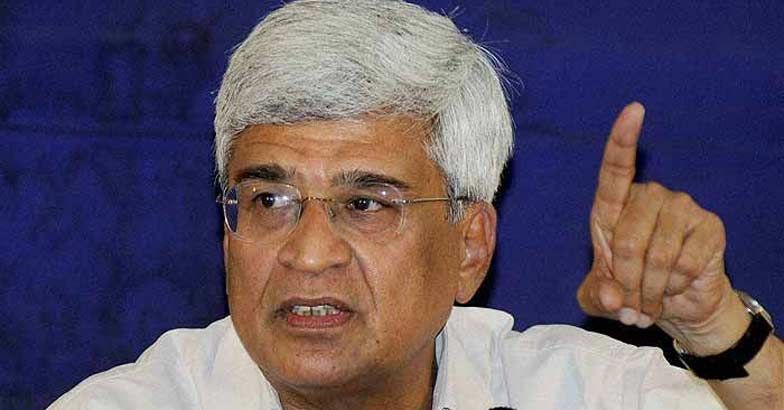According to Somnath Chatterjee, a former Lok Sabha Speaker, who was expelled from the CPI(M), “Karat’s victory is Modi’s victory.” Although Karat has denied that he heads a faction, it is no secret that the CPI(M)’s West Bengal and Kerala units do not always see eye to eye. Here’s a political analysis, for Different Truths.
When in 2008 the CPI(M)’s general secretary of the time, Prakash Karat, was opposing the nuclear deal with the US, it used to be said jocularly that if Manmohan Singh was batting for India, Karat was doing so for China.
It was a jibe which made Karat tell an interviewer that his party was not China’s “stooge”. As is known, two of the staunchest opponents of the deal were China and its “iron brother’, Pakistan.
Now, Karat’s success in persuading the CPI(M) central committee to reject the present general secretary, Sitaram Yechury’s proposal for an alliance with the Congress in 2019 can raise the question whether he is batting for the BJP which will be the obvious beneficiary of the Marxist tactic.
The BJP hasn’t responded officially to the CPI(M)’s decision, but one of its members who appear in TV debates has said that “the Left has left the Congress and so has the Samajwadi Party”, while another has pointed out that despite the CPI(M)’s weakness as a party, Yechury enjoys considerable goodwill and could have helped in uniting non-BJP parties.
 According to Somnath Chatterjee, a former Lok Sabha Speaker, who was expelled from the CPI(M), “Karat’s victory is Modi’s victory.” Chatterjee lost his place in the CPI(M) when he refused to step down as the Speaker when the Left withdrew support to the Manmohan Singh government over the nuclear deal.
According to Somnath Chatterjee, a former Lok Sabha Speaker, who was expelled from the CPI(M), “Karat’s victory is Modi’s victory.” Chatterjee lost his place in the CPI(M) when he refused to step down as the Speaker when the Left withdrew support to the Manmohan Singh government over the nuclear deal.
Karat’s concept of the position of the Lok Sabha Speaker was probably something like that of a party factotum who presided over the Supreme Soviet when the Bolsheviks were in power. Since the Speaker in a parliamentary democracy does not function like a party apparatchik, Chatterjee had to go.
Following the defeat of Yechury’s pro-Congress resolution, there were rumours that he might resign – a step which would have led to the party being “obliterated”, as Chatterjee said.
Although Karat has denied that he heads a faction, it is no secret that the CPI(M)’s West Bengal and Kerala units do not always see eye to eye. This rift first came to the fore when the Jyoti Basu-Promode Dasgupta duo of the Bengal unit opposed the party’s decision taken with the support of EMS Namboodiripad, who belonged to Kerala, to bring down the Morarji Desai government in 1979 to enable Charan Singh to become the prime minister with the Congress’s support.
According to Promode Dasgupta, the toppling game was the handiwork of the “Soviet lobby”. The Congress under Indira Gandhi was believed at the time to be close to the now-defunct Soviet Union while the Soviets regarded Desai and other old guards of the Congress as “reactionaries”.
Dasgupta had also warned against the possibility of the RSS gaining ground by taking advantage of the political uncertainty at the Centre because, as he said, “scratch a Hindu and he is RSS”.
A similar warning about the ascendancy of the Right was given by Rajni Palme Dutt, a founder-member of the British communist party, who wrote in his book, India Today, in 1969 about the “dangers from the Right”. According to him, the threat could only be countered by the “united strength of the communist movement and of all democratic and progressive sections”.
Whether the Congress can be counted among these sections is the moot question. The communists regarded the Congress as their main political adversary before the rise of the Right, especially of the RSS which received a boost during the Emergency according to the Congress leader, Jairam Ramesh, when it aligned itself with Jayaprakash Narayan.
Karat’s views are evidently a continuation of that earlier line of thinking and may have been further strengthened in recent years by the Congress’s preference for what the Left calls neo-liberal economic policies which are determined by international finance capital, to use a communist jargon.
 Yechury, on his part, probably agrees in a large measure with Karat about neo-liberalism and the Congress’s “class” character as a bourgeois-landlord party. But his belief is that the main threat at present is from the Right, represented by the RSS and the BJP, and that it is necessary, therefore, for the communists to act together with the “democratic and progressive” forces, which includes the Congress despite the presence in the party of “reactionary” elements.
Yechury, on his part, probably agrees in a large measure with Karat about neo-liberalism and the Congress’s “class” character as a bourgeois-landlord party. But his belief is that the main threat at present is from the Right, represented by the RSS and the BJP, and that it is necessary, therefore, for the communists to act together with the “democratic and progressive” forces, which includes the Congress despite the presence in the party of “reactionary” elements.
Otherwise, the gainer will be the RSS-BJP in line with what happened in Germany in the 1930s when the influential communists and social democrats were engaged in battling each other while the Nazis emerged victorious.
That event has always been held up as an example of communist misjudgment vis-à-vis the fascists. The only difference is that unlike the initial perceived weakness of the Right in Germany at that time, the RSS-BJP today is much stronger.
Notwithstanding the current ideological hair-splitting among the Leftists over the Congress, it is quite possible that on the eve of the general election, there will be a convergence of the Karat and Yechury lines with the CPI(M) opting for an understanding with the Congress if not a formal alliance. But, for the present, the BJP will be pleased with the disarray among its opponents.
Amulya Ganguli
©IPA Service
Photos from the Internet
#RSSBJP #Nazis #CPIM #Karat #LokSabhaSpeaker #SomnathChatterjee #Leftist #BJP #WestBengal #Kerela #IPA #DifferentTruths





 By
By

